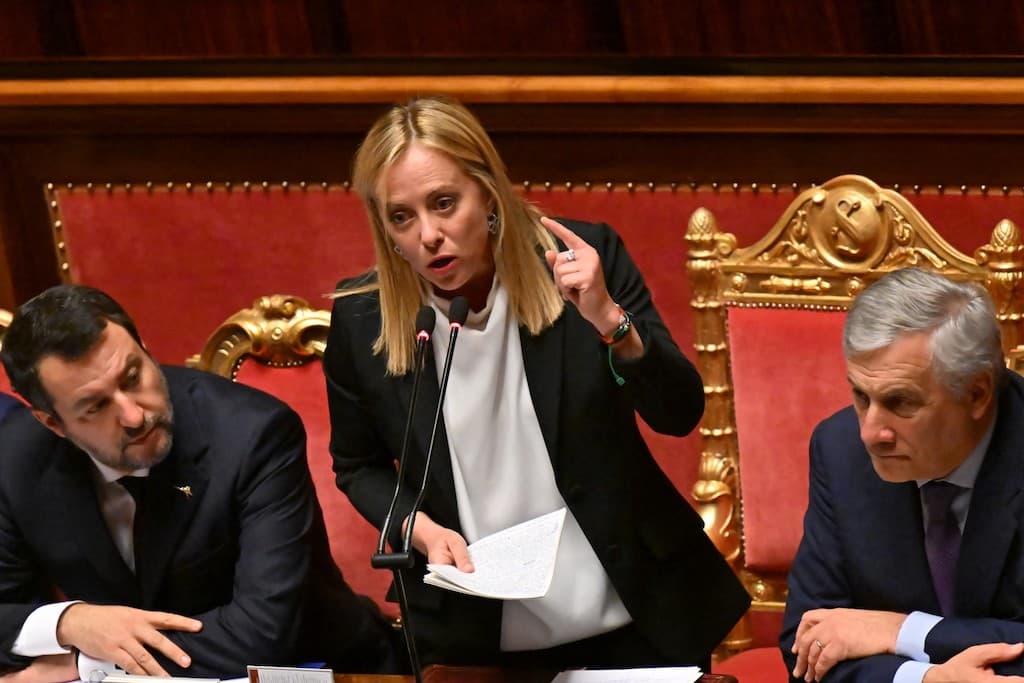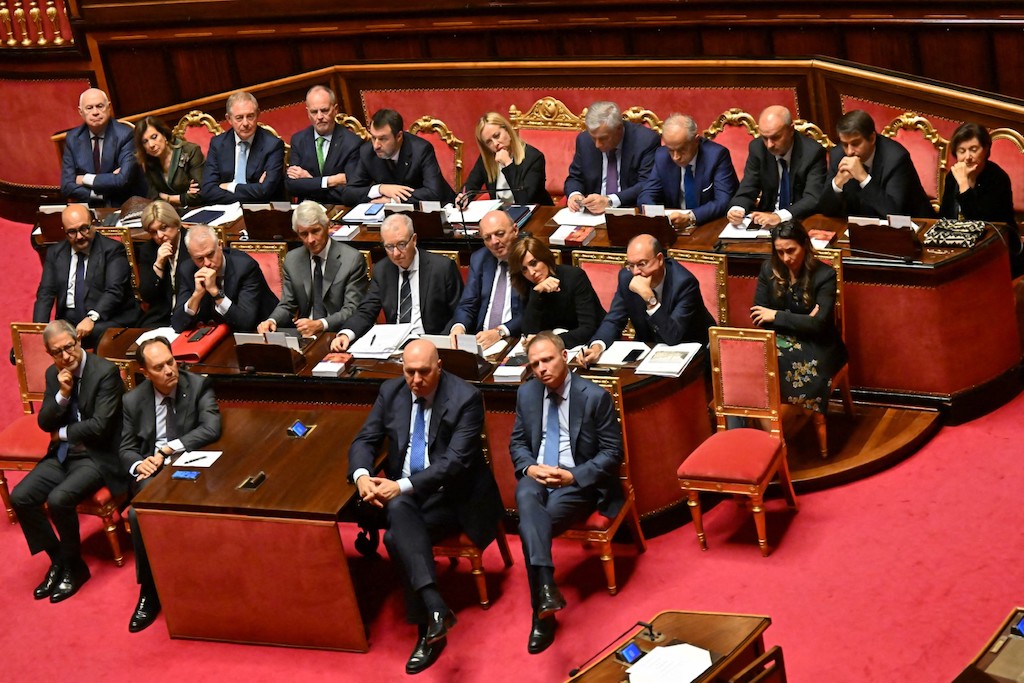Explained: The plan to bring in direct elections for Italy’s prime minister

The Italian government has published more details of plans to reshape the country's politics - by introducing a system critics say isn't found in any other democratic nation. What might the reform mean for Italy?
Prime Minister Giorgia Meloni’s cabinet is set to meet on Friday afternoon to discuss a draft law aimed at overhauling the electoral system and potentially granting the premier greater powers.
The bill, drafted by Senator Maria Elisabetta Casellati, a member of Silvio Berlusconi’s Forza Italia party and a close ally of the former leader, proposes to change Italy’s system of government from that of a parliamentary democracy to what’s being called a ‘premierato’, in which the prime minister is directly elected by voters.
Speaking at a convention over the weekend in which she extolled “the values of the family, of the homeland, of free enterprise,” Meloni said the reform would usher in a “Third Republic”. (Italy is today considered to be in the ‘Second Republic’, after the introduction of a new voting system in 1994.)
Meloni’s government says the reform is needed to stabilise Italian politics and make it easier for governments to carry out the wishes of voters.
READ ALSO: How are Italy’s prime ministers chosen?
While her far-right Brothers of Italy party has long pushed for constitutional change, the proposed reform is quite different to the semi-presidential style system that it had championed just months before.
The ‘premierato’ plan has already faced heavy criticism from experts. Mauro Volpi, a professor of Constitutional Law at the University of Perugia, slammed the proposal as “terrible”, saying that such a system does not exist “in any country in the world.”
What is the government proposing?
It's unclear at this stage: various drafts of the bill have circulated in recent weeks.
One version, obtained by Il Fatto Quotidiano newspaper at the end of August, would have granted the prime minister the authority to appoint ministers and dissolve parliament - currently prerogatives of the president of the republic.
It said a candidate would need 40 percent of the vote to win an election, with runoff elections between the two top contenders if neither reached this threshold.
Casellati has since said the president would retain the power to appoint ministers, and a more up-to-date draft of the bill reportedly proposes to allot 55 percent of parliamentary seats to the winning party or coalition.
READ ALSO: How much power does the Italian president actually have?
On Tuesday morning, Corriere della Sera reported that the latest version would put an end to the president's power to appoint senators for life; and - crucially - give the outgoing prime minister or a member of their party the right to try to re-form a government in the event of a no-confidence vote, putting an end to technical governments appointed by the president.
A prime minister elected under the premierato system would be able to serve a maximum of two five-year terms, according to an early draft.
If enacted, the new rules would not come into force until the next general election. The bill is expected to undergo further changes before being presented to parliament.

Meloni's cabinet is set to meet on Friday to discuss the constitutional reform bill. Photo by Alberto PIZZOLI / AFP.
Is it likely to pass?
Meloni's ruling coalition does not currently have the two-thirds 'supermajority' it would need to push a constitutional reform through parliament.
That means it would need to convince various opposition party leaders to support the bill in order to win a parliamentary majority and avoid having to call a referendum.
Meloni had previously advocated for a transition to a US-style presidential system or French semi-presidential system, but following initial consultations with opposition leaders in May, she switched to the premierato system in the hopes that more parliamentarians would be persuaded to back it.
Whether or not this happens depends on what the final draft of the bill contains, but the need for a referendum is considered likely.
Two relatively recent constitutional referendums - one held in 2006 and one in 2016 - failed to pass (another in 2020, aimed at reducing the number of parliamentary seats, was successful), Volpi noted, meaning the government will likely want to avoid risking one.
What are critics saying about bill?
Speaking to the news outlet Fanpage in early September about an early draft of the bill, Volpi said the proposed reforms would confer unprecedented powers on a democratically elected prime minister.
If the prime minister were given the authority to appoint and dismiss ministers and dissolve parliament based on their direct election by voters, it would make Italy "the only country in the world where this happens," he said.
In 2021, Israel's Netanyahu tried to reintroduce direct elections of the prime minister, a system which the state had abandoned in 2001, but the proposal was widely criticised and ultimately scrapped.
Writing on X, formerly Twitter, Democratic Party senator Dario Parrini said on Monday that the reform risks creating a status quo in which "the head of government keeps parliament and the head of state on a leash."
And parliamentarian Riccardo Magi from the +Europa party argued that Meloni's intention is to "consolidate more and more powers for herself, reducing the role of the President of the Republic and transforming Italy into a country without any balance of powers."
"A strong opposition must be organized throughout the country to this right-wing attempt to transform Italy into Orban's Hungary, where all powers are concentrated in the hands of a single person," he said.
Comments
See Also
Prime Minister Giorgia Meloni’s cabinet is set to meet on Friday afternoon to discuss a draft law aimed at overhauling the electoral system and potentially granting the premier greater powers.
The bill, drafted by Senator Maria Elisabetta Casellati, a member of Silvio Berlusconi’s Forza Italia party and a close ally of the former leader, proposes to change Italy’s system of government from that of a parliamentary democracy to what’s being called a ‘premierato’, in which the prime minister is directly elected by voters.
Speaking at a convention over the weekend in which she extolled “the values of the family, of the homeland, of free enterprise,” Meloni said the reform would usher in a “Third Republic”. (Italy is today considered to be in the ‘Second Republic’, after the introduction of a new voting system in 1994.)
Meloni’s government says the reform is needed to stabilise Italian politics and make it easier for governments to carry out the wishes of voters.
READ ALSO: How are Italy’s prime ministers chosen?
While her far-right Brothers of Italy party has long pushed for constitutional change, the proposed reform is quite different to the semi-presidential style system that it had championed just months before.
The ‘premierato’ plan has already faced heavy criticism from experts. Mauro Volpi, a professor of Constitutional Law at the University of Perugia, slammed the proposal as “terrible”, saying that such a system does not exist “in any country in the world.”
What is the government proposing?
It's unclear at this stage: various drafts of the bill have circulated in recent weeks.
One version, obtained by Il Fatto Quotidiano newspaper at the end of August, would have granted the prime minister the authority to appoint ministers and dissolve parliament - currently prerogatives of the president of the republic.
It said a candidate would need 40 percent of the vote to win an election, with runoff elections between the two top contenders if neither reached this threshold.
Casellati has since said the president would retain the power to appoint ministers, and a more up-to-date draft of the bill reportedly proposes to allot 55 percent of parliamentary seats to the winning party or coalition.
READ ALSO: How much power does the Italian president actually have?
On Tuesday morning, Corriere della Sera reported that the latest version would put an end to the president's power to appoint senators for life; and - crucially - give the outgoing prime minister or a member of their party the right to try to re-form a government in the event of a no-confidence vote, putting an end to technical governments appointed by the president.
A prime minister elected under the premierato system would be able to serve a maximum of two five-year terms, according to an early draft.
If enacted, the new rules would not come into force until the next general election. The bill is expected to undergo further changes before being presented to parliament.

Is it likely to pass?
Meloni's ruling coalition does not currently have the two-thirds 'supermajority' it would need to push a constitutional reform through parliament.
That means it would need to convince various opposition party leaders to support the bill in order to win a parliamentary majority and avoid having to call a referendum.
Meloni had previously advocated for a transition to a US-style presidential system or French semi-presidential system, but following initial consultations with opposition leaders in May, she switched to the premierato system in the hopes that more parliamentarians would be persuaded to back it.
Whether or not this happens depends on what the final draft of the bill contains, but the need for a referendum is considered likely.
Two relatively recent constitutional referendums - one held in 2006 and one in 2016 - failed to pass (another in 2020, aimed at reducing the number of parliamentary seats, was successful), Volpi noted, meaning the government will likely want to avoid risking one.
What are critics saying about bill?
Speaking to the news outlet Fanpage in early September about an early draft of the bill, Volpi said the proposed reforms would confer unprecedented powers on a democratically elected prime minister.
If the prime minister were given the authority to appoint and dismiss ministers and dissolve parliament based on their direct election by voters, it would make Italy "the only country in the world where this happens," he said.
In 2021, Israel's Netanyahu tried to reintroduce direct elections of the prime minister, a system which the state had abandoned in 2001, but the proposal was widely criticised and ultimately scrapped.
Writing on X, formerly Twitter, Democratic Party senator Dario Parrini said on Monday that the reform risks creating a status quo in which "the head of government keeps parliament and the head of state on a leash."
And parliamentarian Riccardo Magi from the +Europa party argued that Meloni's intention is to "consolidate more and more powers for herself, reducing the role of the President of the Republic and transforming Italy into a country without any balance of powers."
"A strong opposition must be organized throughout the country to this right-wing attempt to transform Italy into Orban's Hungary, where all powers are concentrated in the hands of a single person," he said.
Join the conversation in our comments section below. Share your own views and experience and if you have a question or suggestion for our journalists then email us at [email protected].
Please keep comments civil, constructive and on topic – and make sure to read our terms of use before getting involved.
Please log in here to leave a comment.